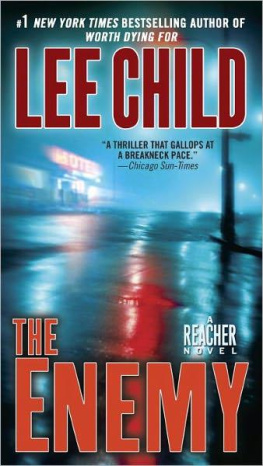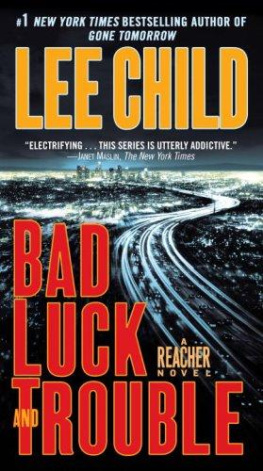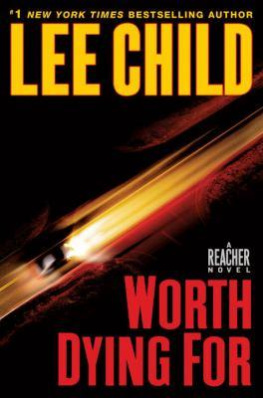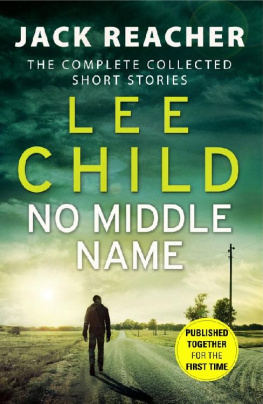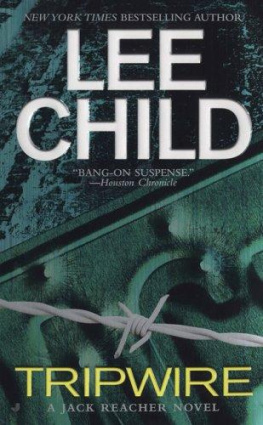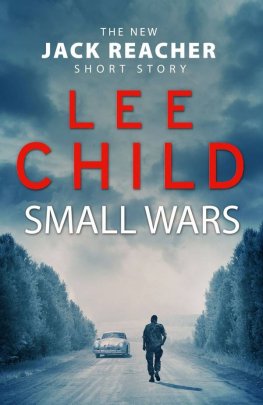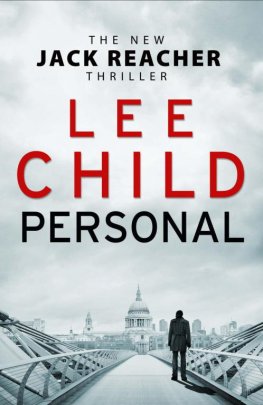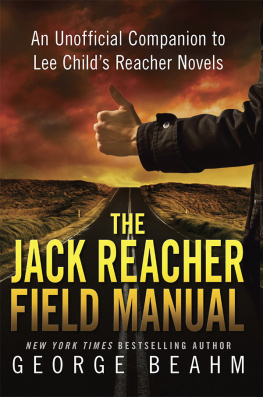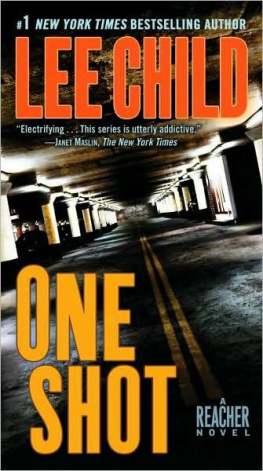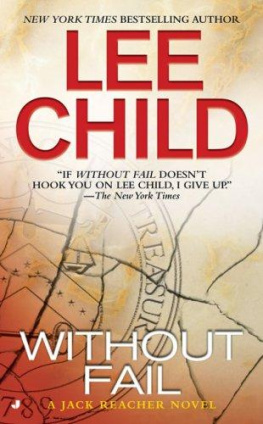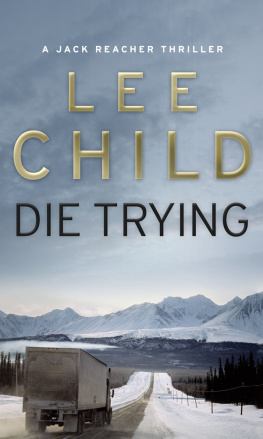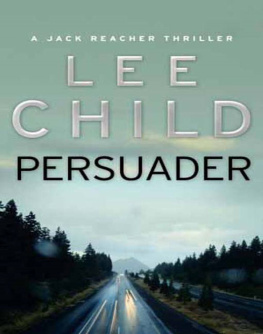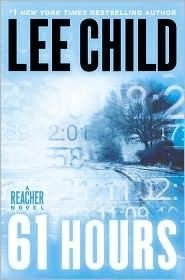Lee ChildThe Enemy
Dedicated to the memory of Addle King
ONE
As serious as a heart attack. Maybe those were KenKramer's last words, like a final explosion of panic in hismind as he stopped breathing and dropped into theabyss. He was out of line, in every way there was, andhe knew it. He was where he shouldn't have been, withsomeone he shouldn't have been with, carrying
something he should have kept in a safer place. But hewas getting away with it. He was playing and winning.
He was on top of his game. He was probably smiling.
Until the sudden thump deep inside his chest betrayedhim. Then everything turned around. Success becameinstant catastrophe. He had no time to put anythingright.
Nobody knows what a fatal heart attack feels like.
There are no survivors to tell us. Medics talk aboutnecrosis, and clots, and oxygen starvation, andoccluded blood vessels. They predict rapid uselesscardiac fluttering, or else nothing at all. They use wordslike infarction and fibrillation, but those terms meannothing to us. You just drop dead, is what they shouldsay. Ken Kramer certainly did. He just dropped dead,and he took his secrets with him, and the trouble he leftbehind nearly killed me too. I waited.
It moved. It jumped ahead six degrees. Its motion wasmechanical and damped and precise. It bounced onceand quivered a little and came to rest.
A minute.
One down, one to go.
Sixty more seconds.
I kept on watching. The clock stayed still for a long,long time. Then the hand jumped again. Another sixdegrees, another minute, straight-up midnight, and 1989
was 1990.
I pushed my chair back and stood up behind the desk.
The phone rang. I figured it was someone calling towish me a happy new year. But it wasn't. It was a civiliancop calling because he had a dead soldier in a motelthirty miles off post.
"I need the Military Police duty officer," he said. I satdown again, behind the desk. "You got him," I said.
"We've got one of yours, dead."
"One of mine?"
"A soldier," he said.
"Where?"
"Motel, in town."
"Dead how?" I asked.
"Heart attack, most likely," the guy said.
I paused. Turned the page on the army-issue calendaron the desk, from December 31st to January 1st.
"Nothing suspicious?" I said.
"Don't see anything."
"You seen heart attacks before?"
"Lots of them."
"OK," I said. "Call post headquarters." I gave him thenumber. "Happy New Year," I said.
"You don't need to come out?" he said.
Death rate in America is around 865 people per 100,000
population per year, and in the absence of sustainedcombat soldiers don't die any faster or slower thanregular people. On the whole they are younger and fitterthan the population at large, but they smoke more anddrink more and eat worse and stress harder and do allkinds of dangerous things in training. So their lifeexpectancy comes out about average. They die at thesame speed as everyone else. Do the math with thedeath rate versus current strength, and you havetwenty-two dead soldiers every single day of everysingle year, accidents, suicides, heart disease, cancer,stroke, lung disease, liver failure, kidney failure. Likedead citizens in Detroit, or Dallas. So I didn't need to goout. I'm a cop, not a mortician.
The clock moved. The hand jumped and bounced and
settled. Three minutes past midnight. The phone rangagain. It was someone calling to wish me a happy newyear. It was the sergeant in the office outside of mine.
"Happy New Year," she said to me.
"You too," I said. "You couldn't stand up and put yourhead in the door?"
"You couldn't put yours out the door?"
"I was on the phone."
"Who was it?"
"Nobody," I said. "Just some grunt didn't make it to thenew decade."
"You want coffee?"
"Sure," I said. "Why not?"
TWO
I put the phone down again. At that point I had been inmore than six years, and army coffee was one of thethings that made me happy to stay in. It was the best inthe world, no question. So were the sergeants. This onewas a mountain woman from north Georgia. I hadknown her two days. She lived off post in a trailer parksomewhere in the North Carolina badlands. She had a
baby son. She had told me all about him. I had heardbecause she brought me coffee. They don't like you,they don't bring you coffee. They knife you in the backinstead. My door opened and she came in, carrying twomugs, one for her and one for me.
"Happy New Year," I said again.
She put the coffee down on my desk, both mugs. "Willit be?" she said.
"Don't see why not," I said.
"The Berlin Wall is halfway down. They showed it onthe television. They were having a big party out there."
"I'm glad someone was, somewhere."
"Lots of people. Big crowds. All singing and dancing."
"I didn't see the news."
"This all was six hours ago. The time difference."
"They're probably still at it."
"They had sledgehammers."
"They're allowed. Their half is a free city. We spentforty-five years keeping it that way."
"Pretty soon we won't have an enemy any more."
I tried the coffee. Hot, black, the best in the world.
"We won," I said. "Isn't that supposed to be a goodthing?"
"Not if you depend on Uncle Sam's paycheck."
She was dressed like me in standard woodland
camouflage battledress uniform. Her sleeves wereneatly rolled. Her MP brassard was exactly horizontal. Ifigured she had it safety pinned in back where nobodycould see. Her boots were gleaming.
"You got any desert camos?" I asked her.
"Never been to the desert," she said.
"They changed the pattern. They put big brownsplotches on it. Five years' research. Infantry guys arecalling it chocolate chip. It's not a good pattern. They'llhave to change it back. But it'll take them another fiveyears to figure that out."
"So?"
"If it takes them five years to revise a camo pattern,your kid will be through college before they figure outforce reduction. So don't worry about it." She saidnothing. "The army hates change, and we'll always haveenemies."
She said nothing. My phone rang again. She leanedforward and answered it for me. Listened for abouteleven seconds and handed me the receiver.
"Colonel Garber, sir," she said. "He's in D.C."
She took her mug and left the room. Colonel Garberwas ultimately my boss, and although he was a pleasanthuman being it was unlikely he was calling eightminutes into New Year's Day simply to be social. Thatwasn't his style. Some brass does that stuff. They comeover all cheery on the big holidays, like they're reallyjust one of the boys. But Leon Garber wouldn't havedreamed of trying that, with anyone, and least of all with
Next page 
